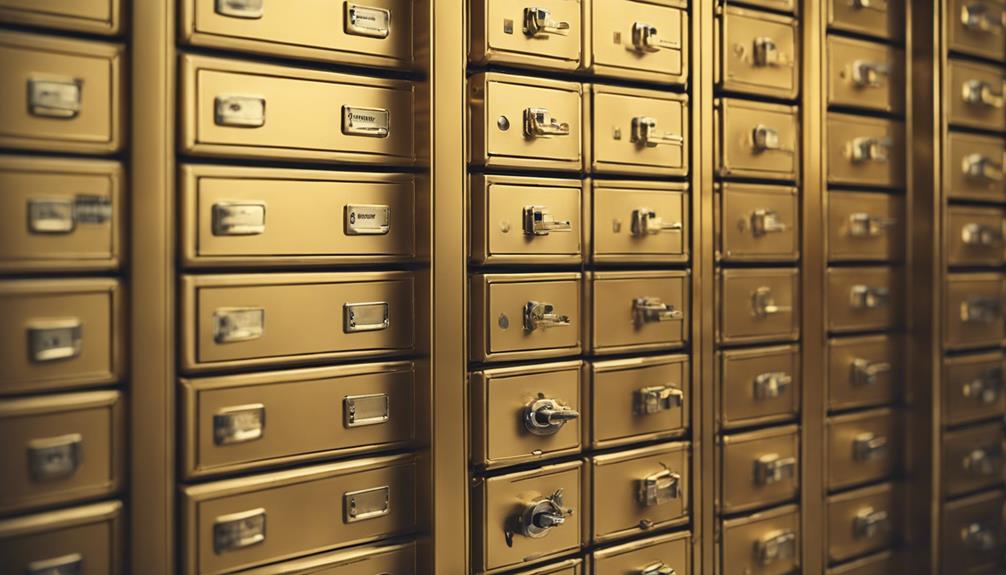Investing in a Gold IRA in Illinois allows you to diversify your retirement portfolio with precious metals while abiding by local regulations. It is important to work with IRS-approved custodians and ensure the gold meets the minimum purity standard of 99.5%. Illinois does not impose extra state taxes on distributions, but keep in mind that sales tax is applicable when purchasing gold. When considering various custodians and storage choices, prioritize trustworthy facilities to protect your investment. Being knowledgeable about these rules can lead to growth opportunities, and there is a wealth of information to learn about optimizing your investment strategy.
Key Takeaways
- Gold IRAs in Illinois require compliance with IRS regulations, including a minimum gold purity standard of 99.5%.
- Custodians must be IRS-approved and provide access to secure, insured storage facilities for physical gold.
- Illinois does not impose additional state taxes on Gold IRA distributions, but state sales tax applies to gold purchases.
- Early withdrawals before age 59½ incur a 10% penalty, along with income tax, emphasizing the need for strategic planning.
- Local resources, such as seminars and networking opportunities, can help investors navigate gold IRA investments and market trends effectively.
Understanding Gold IRAs

A Gold IRA offers you a unique opportunity to invest in physical gold and other precious metals within your retirement account. This investment vehicle lets you diversify your portfolio, protecting your savings from market volatility.
Additionally, many reputable companies like Noble Gold offer a range of precious metal investment options tailored to individual investor needs. To establish a Gold IRA, you'll need a self-directed IRA custodian that specializes in precious metals, guaranteeing compliance with IRS regulations.
The IRS mandates that the gold and other metals must meet specific purity standards, with a minimum of 99.5% purity for gold.
For 2024, your contributions to Gold IRAs are limited to $7,000 if you're under 50, or $8,000 if you're 50 or older. Be mindful, though, as excess contributions can incur a 6% annual tax.
Understanding withdrawals is essential, too—if you take money out before age 59½, you'll face a 10% penalty plus income tax.
Additionally, your precious metals must be stored in an IRS-approved storage facility to comply with regulations. This guarantees your assets are secure and properly managed, allowing you to focus on growing your investment without worrying about compliance issues.
Local Regulations in Illinois

When investing in a Gold IRA in Illinois, you need to be aware of the state's alignment with federal regulations regarding custodians and storage facilities. These regulations ensure that your assets are held securely and in compliance with legal requirements, providing peace of mind for investors. It’s important to select a reputable custodian and an approved storage facility to safeguard your investment. Similarly, when exploring options for gold IRA investing in Indiana, adhering to both state and federal guidelines is essential to protect and grow your retirement portfolio.
There aren't any additional state taxes on your Gold IRA distributions, but the federal rules still apply.
Make certain your gold is kept in IRS-approved depositories to guarantee compliance and protect your investment.
State-Specific Tax Implications
Understanding state-specific tax implications is essential for anyone considering gold IRA investing in Illinois. When you purchase gold for your IRA, be mindful that state sales tax applies, which can increase your overall investment cost.
However, you'll be pleased to know that Illinois doesn't impose a state income tax on gains from the sale of precious metals, making it a favorable environment for your investments.
While federal regulations govern gold IRAs, Illinois law may introduce additional requirements, including specific storage and reporting obligations. You'll want to verify that your gold IRA custodian is compliant with these local regulations and registered with the Illinois Secretary of State. This will help you avoid any potential issues down the line.
To navigate these tax implications effectively, it's wise to consult a tax professional who understands both federal and state regulations. They can provide valuable investment advice tailored to your situation.
Additionally, working with reputable gold IRA companies and gold dealers will confirm that you're getting the best value while maintaining compliance with all necessary regulations. This proactive approach will help safeguard and optimize your gold IRA investments in Illinois.
Custodian Requirements Overview
As you consider gold IRA investing in Illinois, it's important to grasp the custodian requirements that come into play. In the state, you'll need an IRS-approved custodian to manage your account and guarantee compliance with federal regulations. These custodians facilitate the purchase and storage of physical precious metals, adhering to strict purity standards: 99.5% for gold, 99.9% for silver, and 99.95% for platinum and palladium.
To help you understand the essentials, here's a quick overview of key custodian factors:
| Factor | Description |
|---|---|
| Custodian Type | IRS-approved custodians are required. |
| Compliance | Must adhere to federal and Illinois state regulations. |
| Storage Options | Secure storage in IRS-approved depositories is essential. |
| Fees | Review and compare custodian fees before choosing. |
| Licensing | Illinois Secretary of State oversees custodian licenses. |
Investors should also check that custodians offer secure storage options. Remember, fees and services can vary markedly, so it's imperative to review these factors carefully to avoid unexpected costs in managing your gold IRA.
Approved Storage Facilities
In Illinois, securing your gold IRA assets requires using IRS-approved storage facilities that meet strict regulations. These facilities are vital for safeguarding your precious metals, as they guarantee compliance with IRS guidelines. By using an approved custodian, you can rest assured that your gold IRA accounts are managed properly and reported as required.
When selecting a storage facility, make certain it's an IRS-approved depository. These depositories guarantee that your gold meets the IRS's purity standards of 99.5% or higher, confirming your investment's quality. You can find a list of approved non-bank custodians and depositories on the IRS website, making it easier to verify compliance with local and federal regulations.
It's important to choose a storage facility that's insured and audited regularly. This protects your investments and provides peace of mind, knowing that your precious metals are in secure hands.
Always conduct thorough research and verify that your chosen facility meets these requirements. By doing so, you'll be well on your way to safely managing your gold IRA investments in Illinois.
IRS Compliance and Requirements

Steering through IRS compliance and requirements for gold IRA investing can feel intimidating, but it's essential for safeguarding your investments. To begin, verify that any gold you include in your IRA meets the minimum purity standard of 99.5%. Only certain coins and bullion qualify under IRS regulations.
Managing your gold IRA requires an account custodian approved by the IRS, who'll handle the purchase, storage, and transportation of your precious metals. Compliance doesn't stop there; all gold must be stored in IRS-approved depositories. Failing to adhere to these regulations can jeopardize your IRA status and lead to severe tax penalties.
Additionally, keep in mind the contribution limits for 2024: you can contribute up to $7,000 if you're under 50, or $8,000 if you're 50 or older. Exceeding these limits results in a 6% annual tax on the excess amount.
Lastly, don't forget about required minimum distributions (RMDs). Starting at age 72, you must take RMDs from your traditional gold IRA, or face a 25% penalty on the missed amount—reduced to 10% if corrected within two years.
Investment Options in Precious Metals

As you explore investment options in precious metals, you'll find a variety of choices, including gold, silver, platinum, and palladium.
Gold IRAs, in particular, provide a hedge against inflation and economic downturns, making them an attractive option for retirement portfolios.
Understanding different investment strategies and staying informed about market trends can help you make smart decisions.
For instance, being aware of IRS regulations for eligible metals can greatly influence your Gold IRA investments in Illinois.
Let's look at how these factors can influence your Gold IRA investments in Illinois.
Types of Precious Metals
Exploring the various types of precious metals available for investment can greatly enhance your Gold IRA portfolio. When investing in a Gold IRA, you can include eligible precious metals like gold, silver, platinum, and palladium. Each metal has specific purity requirements: gold must be at least 99.5% pure, silver at 99.9%, and both platinum and palladium at 99.95%.
To qualify for your IRA, only coins and bars produced by national government mints or accredited manufacturers are acceptable, ensuring compliance with IRS regulations. Popular options include American Gold Eagles, Canadian Maple Leafs, and various approved bullion bars that meet these purity standards.
While your Gold IRA primarily focuses on physical precious metals, you might also consider investing in gold mining stocks or physically backed ETFs as alternative options.
Including these precious metals in your retirement account is often recommended to make up 5% to 10% of your overall investment portfolio for effective diversification and risk mitigation. By diversifying with these metals, you can strengthen your financial future while maneuvering market volatility.
Investment Strategies Overview
Investing in precious metals offers a range of options that can fit various financial strategies. One popular choice is a gold IRA, which allows for a tax-advantaged investment in physical gold and other eligible metals like silver, platinum, and palladium.
To comply with IRS regulations, gold must meet a strict purity requirement of 99.5%, while silver must be 99.9%, and platinum and palladium must be 99.95%. Additionally, many investors find that comparing Gold IRA providers can help them make informed decisions that align with their retirement goals.
Besides Gold IRAs, you might consider physically backed gold ETFs, such as the SPDR Gold Trust, or investing in gold mining stocks for exposure to the precious metals market.
Incorporating precious metals into your investment portfolio can enhance your diversification strategies. Financial experts typically recommend allocating 5% to 10% of your portfolio to precious metals, providing a hedge against economic volatility and inflation.
Market Trends Analysis
In recent years, the precious metals market has shown notable resilience, making it an attractive option for investors looking to diversify their portfolios. With historical growth demonstrating that a $2,500 investment in gold could potentially grow to $20,000 in a decade, it's clear that gold IRAs can greatly enhance your retirement savings.
Gold's average annual return of 7.98% since 1971 positions it as a viable inflation hedge, especially in uncertain economic times. Additionally, understanding the process of converting your 401k to a Gold IRA can provide further advantages for retirement planning, as it allows for a more tailored investment approach in line with your financial goals.
Gold IRA Rollovers can help guarantee your investments are secure and compliant with IRS regulations.
Market trends indicate that investors should consider allocating between 5% and 10% of their overall investment portfolio to precious metals. This strategy not only helps to protect your assets during economic downturns but also reinforces gold's role as a safe haven.
Understanding local regulations and IRS rules regarding Gold IRAs is essential to guarantee compliance and maximize your investment benefits.
As you navigate the precious metals market, keep an eye on demand fluctuations and economic indicators. By staying informed, you'll make better decisions that align with your long-term financial goals, ultimately enhancing your retirement strategy through the inclusion of precious metals.
Contribution Limits and Withdrawals

Understanding contribution limits and withdrawal rules is essential for managing your Gold IRA effectively. For 2024, you can contribute up to $7,000 if you're under 50, and $8,000 if you're 50 or older, thanks to the catch-up contributions.
Remember, exceeding these contribution limits can lead to a 6% excise tax, so stay within the IRS limits to avoid penalties.
If you consider taking an early withdrawal from your Gold IRA before reaching age 59½, be aware that a 10% penalty applies, alongside any income tax due. This underscores the importance of careful retirement planning.
Once you reach age 73, you must start taking Required Minimum Distributions (RMDs) from your traditional Gold IRA, ensuring you're not deferring taxes indefinitely.
Fortunately, Gold IRAs allow for rollovers from existing retirement accounts without incurring immediate tax penalties, as long as you follow the specified time frames for depositing funds into the new account.
Risks of Gold IRA Investing

Many investors overlook the risks associated with Gold IRA investing, which can greatly impact their retirement savings. One major concern is the volatility of gold prices, influenced by market demand and economic conditions, leading to significant investment risk.
You might also face liquidity issues when trying to sell physical gold, as the process can be delayed and involve extra fees.
Additionally, guaranteeing compliance with IRS regulations is vital. Noncompliance can lead to severe penalties, including the entire IRA balance becoming taxable if you invest in ineligible gold or fail to meet purity standards.
Finding compliant custodians and secure storage facilities can add unexpected costs and challenges to managing your Gold IRA.
Moreover, the gold investment market isn't free from risks of fraud or scams. It's important to conduct thorough due diligence when selecting custodians and dealers to guarantee your investment remains secure and compliant.
Selecting a Gold IRA Custodian

Choosing the right Gold IRA custodian is essential for guaranteeing your investment is both secure and compliant with IRS regulations. To make an informed decision, consider the following factors:
- IRS-approved: Guarantee your custodian specializes in self-directed IRAs and is recognized by the IRS.
- Fees: Research various fees, including setup, storage, and annual maintenance costs, as these can impact your overall returns.
- Positive customer reviews: Look for custodians with a strong track record and testimonials from satisfied clients to gauge their reliability and expertise.
- Secure storage: Verify that the custodian provides access to IRS-approved depositories for the secure storage of your gold and other precious metals.
Taking the time to evaluate each Gold IRA custodian on these criteria will help you navigate the investment process more smoothly.
Additionally, consider consulting educational resources or guides offered by custodians to deepen your understanding of the types of gold allowed in your IRA.
Storage Solutions for Precious Metals

When investing in a Gold IRA, secure storage solutions for your precious metals are fundamental. You must store your gold in IRS-approved depositories to guarantee your investment remains compliant with regulations. In Illinois, you have the option to use local accredited vaults or national depository services, both of which meet the required purity standards—99.5% for gold, 99.9% for silver, and 99.95% for platinum and palladium.
Your custodian plays an important role in managing the transport and storage of your precious metals. They're responsible for maintaining compliance with IRS regulations and providing annual performance reports to keep you informed about your investment.
Be aware that there are associated storage fees with these services, which can vary considerably depending on the custodian and depository you choose.
It's essential to research and select a reputable custodian and depository to avoid penalties or potential loss of your IRA status. Proper storage not only protects your investment but also guarantees that you adhere to all necessary regulations, allowing you to focus on your long-term financial goals.
Market Trends and Opportunities

Investors in Illinois are increasingly turning their attention to gold and precious metals as market volatility and economic uncertainty rise. With the average annual return for gold sitting at around 7.98% since 1971, it's a historically profitable investment, especially during inflationary periods.
As you explore opportunities in this space, consider the following market trends:
- A growing number of gold IRA companies in Illinois offering tailored services.
- Increased interest in physical gold investments due to economic concerns.
- Local seminars and workshops that provide insights into investment strategies.
- Rising inflation forecasts prompting a shift in retirement portfolios towards precious metals.
These developments create a fertile ground for Illinois investors looking to diversify their precious metals IRA.
Keep a close eye on the significant price fluctuations in gold, as they can impact your investment strategies. Engaging with local resources and staying informed about market trends will help you navigate this dynamic landscape effectively.
Frequently Asked Questions
What Are the Requirements for a Gold Ira?
To qualify for a Gold IRA, you need gold with at least 99.5% purity, managed by a qualified custodian. Also, keep documentation for eligible purchases to avoid tax penalties and comply with IRS regulations.
Is Investing in Gold IRA a Good Idea?
Investing in a Gold IRA can be a smart move for your retirement. It offers tax advantages, protects against inflation, and diversifies your portfolio. Just guarantee you understand the rules and contribute consistently.
How Do You Make Money With a Gold Ira?
To make money with a Gold IRA, you'll benefit from gold's long-term price appreciation, tax advantages, and potential income through gold-backed investments. Choosing compliant products helps maximize your gains while protecting against inflation.
What Is the Best Gold IRA Company?
Did you know that 64% of investors prefer companies with strong customer reviews? To find the best Gold IRA company, check their track record, fees, and educational resources to guarantee your investment aligns with your goals.
Conclusion
Investing in a Gold IRA in Illinois can be a smart way to diversify your retirement portfolio. By understanding local regulations, compliance requirements, and selecting the right custodian, you can seize valuable opportunities in precious metals. For instance, imagine a retiree named Jane who invested in gold during a market downturn and watched her savings grow markedly over time, providing her with financial security. With careful planning, you can also enjoy the benefits of a Gold IRA.










